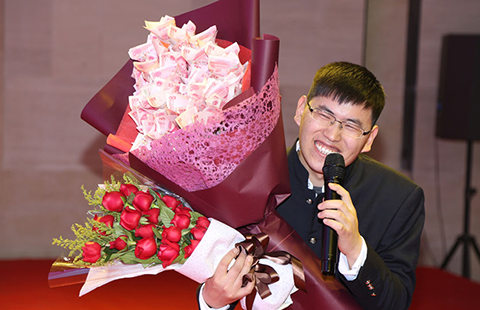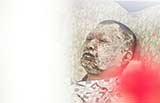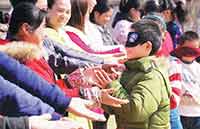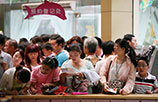LegCo vote turnout sets record
By Li Likui (China Daily HK Edition) Updated: 2012-09-10 13:13The 2012 Legislative Council election ended on Sunday and recorded a high turnout rate of 53 percent, chalking a first in Hong Kong's electoral history with each voter given dual ballots.
A total of about 1.83 million registered geographical constituency electors cast their votes in the Legislative Council Election from 7.30 am to 10.30 pm on Sunday, representing a provisional cumulative turnout rate of about 53 percent.
About 150,000 registered electors of the traditional functional constituencies cast their votes in their respective functional constituency, representing a cumulative turnout rate of about 69.6 percent. About 1.67 million electors cast their votes in the District Council (second) functional constituency election. The provisional cumulative turnout rate is about 51.9 percent.
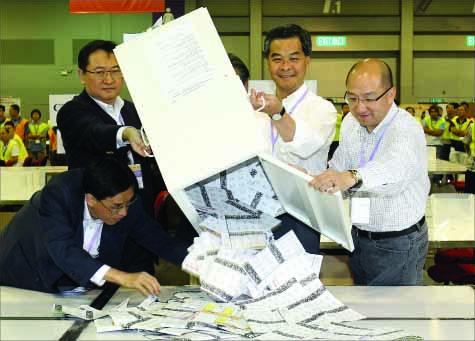 |
|
Chief Executive Leung Chun-ying (2nd right), Electoral Affairs Commission Chairman Justice Barnabas Fung Wah (2nd left) and Secretary for Constitutional and Mainland Affairs Raymond Tam (right) open the ballot box in the Central Counting Station at the AsiaWorld-Expo in Lantau Island after the LegCo voting closed. [Edmond Tang/China Daily] |
This year, there was a high number of 3,466,000-odd people registered as geographical constituency electors. And a total of 574 polling stations were set up across the city.
The competition was intensified due to a record high number of candidates and candidate lists. A total of 67 lists, with 216 candidates, were competing for the 35 seats in the five geographical constituencies. Fifty-three validly nominated candidates competed for the functional constituency election.
Unprecedentedly, this year, voters had two votes, one in the geographical constituency; and another in picking a District Council (Second) functional constituency candidate ("super seats"). For the newly established five "super-seats", which were voted by all voters across the city, there were seven lists with 18 candidates.
Describing the election as "successful", Chief Executive Leung Chun-ying praised the good order of the polling stations and the candidates' efforts in the election.
Electoral Affairs Commission Chairman Fung Wah said the voting went smoothly and he was glad that the turnout rate turned out to be so high, adding that a preliminary result of the election will be announced at around noon today.
"As always, the Electoral Affairs Commission will ensure this election will be undertaken by the principles of fairness, justice and honesty," Fung said.
According to the exit poll conducted by the Public Opinion Program of the University of Hong Kong, in Hong Kong Island, the leading candidates were Sin Chung-kai from Democratic Party, Chan Ka-lok from Civic Party and Ho Sau-lan from Labour Party.
In Kowloon East, DAB's Chan Kam-lam was the forerunner of all the other contestants. In Kowloon West, Wong Yuk-man from People Power and Mo Man-ching from Civic Party were the front runners.
In New Territories East, four candidates pulled ahead of other contestants with extremely high polling rates, including Leung Kwok-hung from League of Social Democrats, Lau Wai-hing from Democratic Party, Quat Elizabeth from DAB and Cheung Chiu-hung from Labour Party.
In New Territories West, Civic Party's Kwok Ka-ki had outrun all the other contestants in the constituency.
For the fiercely contested super-seats, DAB's Lee Wai-king, Democratic Party's To Kun-sun, Democratic Party's Ho Chun-yan and Fung Kin-kee from Hong Kong Association for Democracy and People's Livelihood, had outrun the other candidates.
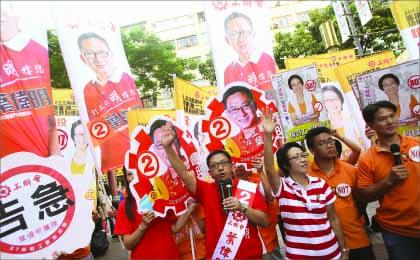 |
|
Federation of Trade Unions candidates canvas for support in Taipo on Sunday. [Edmond Tang/China Daily] |
In addition to that, among the 30 seats in the 28 functional constituencies, 16 candidates of 14 functional constituencies were returned to the seats uncontested, including Heung Yee Kuk, insurance, transport, labor, real estate and construction. The remaining 14 seats in the functional constituencies had seen 37 candidates contesting.
Sung Lap-kung, academic coordinator of Public Administration & Management in the School of Continuing and Professional Education of the City University of Hong Kong, found the turnout rate "shockingly high". Sung attributed the high turnout rate to the frequent media coverage of the highly-debated Moral and National Education (MNE) in the last few days.
"The controversial MNE has not only attracted those who oppose the MNE, but also pushed out those who support it," said Sung.
Sung said the opposition camp have been split into different factions, severely affecting its success rate of allocating votes, a common tactic used under the current Hong Kong electoral methods — a proportional representation system. On the contrary, the pro-establishment camp has a clear target of its candidate lists and a better ability to allocate the votes properly.
Kahon Chan contributed to this story.
- All options remain open in HK national education
- HK chief executive hails Paralympic medalist
- HK promises to control mainland visitors' number
- HK govt to bolster sports development: CY Leung
- HK chief urges safety of islands activists
- CY Leung backs inquiry over plastic spill in HK
- Leung Chun-ying, new chief executive of HKSAR
- Hu urges new HKSAR govt to promote harmony, stability
- Beijing set to double air monitoring stations
- Train ticket glitch results in a lawsuit
- Many workers looking to change jobs in new year
- China looks to regulate city growth
- Beijing to raise threshold for issuing air pollution 'red alerts'
- Green cards decision to bear fruit for foreigners
- Fake story online sparks concern over credibility of cyberspace
- SW China fire affects 120, damages 60 houses
- Beijing eyes public-private partnerships for priority projects
- Violence, legislative inaction harming HK, leaders say
